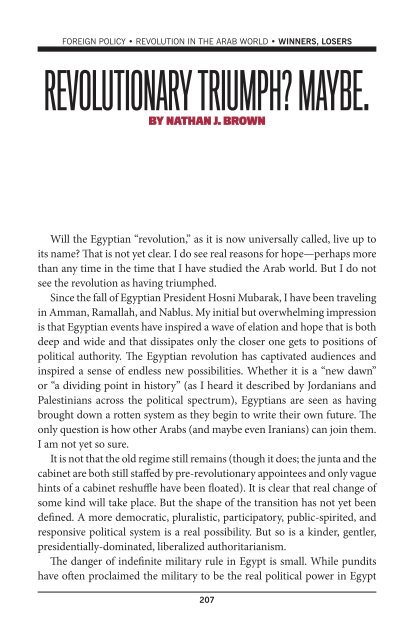Revolution in the Arab World - Observation of a lost soul Blog
Revolution in the Arab World - Observation of a lost soul Blog
Revolution in the Arab World - Observation of a lost soul Blog
Create successful ePaper yourself
Turn your PDF publications into a flip-book with our unique Google optimized e-Paper software.
foreign policy • revolution <strong>in</strong> <strong>the</strong> arab world • w<strong>in</strong>ners, losers<br />
<strong>Revolution</strong>ary Triumph Maybe.<br />
By Nathan J. Brown<br />
Will <strong>the</strong> Egyptian “revolution,” as it is now universally called, live up to<br />
its name That is not yet clear. I do see real reasons for hope—perhaps more<br />
than any time <strong>in</strong> <strong>the</strong> time that I have studied <strong>the</strong> <strong>Arab</strong> world. But I do not<br />
see <strong>the</strong> revolution as hav<strong>in</strong>g triumphed.<br />
S<strong>in</strong>ce <strong>the</strong> fall <strong>of</strong> Egyptian President Hosni Mubarak, I have been travel<strong>in</strong>g<br />
<strong>in</strong> Amman, Ramallah, and Nablus. My <strong>in</strong>itial but overwhelm<strong>in</strong>g impression<br />
is that Egyptian events have <strong>in</strong>spired a wave <strong>of</strong> elation and hope that is both<br />
deep and wide and that dissipates only <strong>the</strong> closer one gets to positions <strong>of</strong><br />
political authority. The Egyptian revolution has captivated audiences and<br />
<strong>in</strong>spired a sense <strong>of</strong> endless new possibilities. Whe<strong>the</strong>r it is a “new dawn”<br />
or “a divid<strong>in</strong>g po<strong>in</strong>t <strong>in</strong> history” (as I heard it described by Jordanians and<br />
Palest<strong>in</strong>ians across <strong>the</strong> political spectrum), Egyptians are seen as hav<strong>in</strong>g<br />
brought down a rotten system as <strong>the</strong>y beg<strong>in</strong> to write <strong>the</strong>ir own future. The<br />
only question is how o<strong>the</strong>r <strong>Arab</strong>s (and maybe even Iranians) can jo<strong>in</strong> <strong>the</strong>m.<br />
I am not yet so sure.<br />
It is not that <strong>the</strong> old regime still rema<strong>in</strong>s (though it does; <strong>the</strong> junta and <strong>the</strong><br />
cab<strong>in</strong>et are both still staffed by pre-revolutionary appo<strong>in</strong>tees and only vague<br />
h<strong>in</strong>ts <strong>of</strong> a cab<strong>in</strong>et reshuffle have been floated). It is clear that real change <strong>of</strong><br />
some k<strong>in</strong>d will take place. But <strong>the</strong> shape <strong>of</strong> <strong>the</strong> transition has not yet been<br />
def<strong>in</strong>ed. A more democratic, pluralistic, participatory, public-spirited, and<br />
responsive political system is a real possibility. But so is a k<strong>in</strong>der, gentler,<br />
presidentially-dom<strong>in</strong>ated, liberalized authoritarianism.<br />
The danger <strong>of</strong> <strong>in</strong>def<strong>in</strong>ite military rule <strong>in</strong> Egypt is small. While pundits<br />
have <strong>of</strong>ten proclaimed <strong>the</strong> military to be <strong>the</strong> real political power <strong>in</strong> Egypt<br />
207




